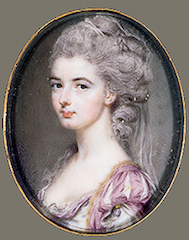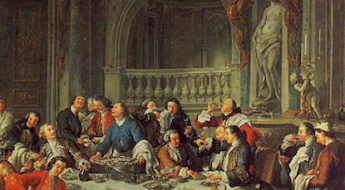
La Maréchale d’Aubemer, Nouvelle du XVIIIème Siècle, or The Widow of Field Marshal d’Aubemer: A Novella of the 18th Century, posthumously published in 1867, is a novel by the author and memoirist Madame de Boigne, born Adélaïde d’Osmond (1781-1866). Mine is the first English translation, available here for the first time anywhere.
In Chapter 4, the Maréchale d’Aubemer’s niece attends her first ball in Paris.
THE WIDOW OF FIELD MARSHAL D’AUBEMER: A NOVELLA OF THE 18TH CENTURY
CHAPTER FOUR
A Ball
The end of Carnival brought the day destined for the English ambassadress’s ball. It was to be the last as well as the most splendid one of the season, and the ladies set to work so as to be able to shine at it.
First thing in the morning, a young woman from Mademoiselle Augustine, the renowned couturiere, had brought an exquisite ball gown to Mme de Saveuse’s, wishing to be informed at what hour she should come back to dress her. Mademoiselle herself would personally put the finishing touches on Madame la Comtesse’s ensemble. The latter would gladly have declined these services had she not recognized in them her aunt’s solicitude. She thus accepted, indicating an hour that very much surprised Mlle Augustine’s young woman, who was accustomed to seeing ladies wearing such elegant gowns not arrive at a ball until such time as their entrance would create the greatest sensation. Mme de Saveuse, however, intended to go and wait at the Hôtel d’Aubemer until Mme de Montford came to take her to the English ambassador’s residence, not thinking of the danger of mussing her dress. The Duchesse had fixed a time that was rather earlier than the Maréchale would have liked, for despite having a great store of good sense, she was too much a woman of the world not to wish for what she called “a brilliant debut” for her niece. She knew that to obtain one it was necessary to display some slight nuance of originality, and, to this end, she desired that with Mlle Augustine’s dress, executed in the purest taste of the fashion of the day and adjusted by that inimitable person herself so as to defy any feminine criticism, the Comtesse Lionel should keep her customary hair style in order to be more beautiful and also to attract attention. This hair style, consisting of loose plaits and large ringlets, which could not be imitated without such magnificent hair as her niece’s, would have to be nearly unique to Mme de Saveuse and would assure a lasting impact. The difficulty, which the Maréchale felt keenly, was in getting her niece to enlist in the plan, and she manoeuvred with requisite skill. She had managed to recount in front of her niece several instances of the tardiness of the hairdressers of Paris, and when the latter came in the morning to thank her for her charming gown, Mme d’Aubemer said to her with an air of indifference, “I thought, my child, that since she’s having the goodness to escort you, it wouldn’t be polite to keep Mme de Montford waiting because of some hairdresser’s lateness of the kind we’ve been talking about recently, and in the event that yours doesn’t turn up, there would be no inconvenience in putting up your hair the way you do it every day, only, in order to look sufficiently dressed up, you would replace your tortoise-shell comb with this one; that way, you would look very presentable.” She handed Mme de Saveuse a superb diamond hair-comb and said no more about her hair-do.
Lionel was also much concerned about his wife’s appearance and was very anxious that she should not shame him by looking provincial. He had studied the Princesse Simon’s attire as best he could at a recent ball and would have liked it to be imitated, but his account of it did not satisfy Mme de Saveuse’s pure taste, and he found himself forced to agree that the gown chosen by the Maréchale was very elegant, though he found it a little too simple. The hairdresser did not arrive; nor indeed would he, the Maréchale having notified him that his skills were no longer required. Lionel despaired. Mme de Saveuse remarked calmly how much this famous M Hubert warranted the reputation for unreliability of which he was accused, and, despite Lionel’s supplications to send for another hairdresser, set about accomplishing her aunt’s intentions without ever doubting their motive. The striking impression of the comb somewhat reconciled Lionel to the beauty of her otherwise unadorned tresses, but, sighing, he repeated, “No one wears their hair like that, you’ll look provincial, very provincial!”
“Well, then, my dear, what a great misfortune! Why should I not look like a provincial, having arrived so recently from Limousin, where I was born? I shall certainly not look ridiculous, since my aunt, who knows these things better than we do, authorized me to do it this way if the precious M Hubert didn’t arrive in time. You will agree that if Babet and I, neither of us knowing any more about it than the other, had tried to create all those butterflies and garlands on my head, we would have acquitted ourselves very badly, and then you would find me quite embarrassing.”
The arrival of Mlle Augustine’s young woman, soon followed by Mlle Augustine in person, who pronounced the hair-do delicious, ravishing, adorable, and destined to cause a furore, and who, after having circled around her and replaced a few pins, pronounced Madame la Comtesse fit to be painted and coiffed like an angel, reassured Lionel. He nonetheless resolved to arrive late at the ball, first because he had noticed that such was the habit of Henri d’Estouteville, and secondly in order not to be there at his wife’s arrival, the effect of which he doubted. Perfectly calm by contrast, and not thinking for a moment that she needed to put on a performance of any kind, Mme de Saveuse went along to the Hôtel d’Aubemer. Raised in a small circle among benevolent people who had watched her charms increase without noticing them more one day than another, and sharing their indifference in this regard, she was accustomed to being loved more than admired, and knew herself to be pretty without thinking about it; it was with real ingenuousness that she was making her debut in society, counting on the general goodwill, but not seeking to make any sort of impression and satisfied to be a face in the crowd. Once only, at a ball given by the Intendant1 of Limoges, had her beauty drawn all eyes; she did not realize it then, but remembered having had a very good time. She thus had no fear of the Parisians, having never imagined in her naivety that she could ever attract any notice among them. She only thought that, not knowing anyone, she would not be asked to dance, which would be painful for Lionel and also a little for herself because she loved to dance. This was her principal concern. It was not shared by any of the Maréchale’s friends when Mme de Saveuse appeared in the salon with a face like Hebe’s2 and the deportment of a nymph, beautiful in her simplicity, and without any appearance of affectation or false modesty.
The Maréchale rejoiced fully in the success of her ruse, and when her niece had gone out in Mme de Montford’s wake, she could not resist extolling her grace and her noble, distinguished air: “I was waiting for this last test before her proclaiming her a woman completely fit for the highest sort of company. In generally, it takes extreme knowledge of the ways of the world — which many people never acquire — to carry off full evening dress with such ease and simplicity, but this little girl has divined it all by intuition.”
The example given by the Maréchale was followed heartily by her regulars, and they did not stint in their praise for the charming debutante just sent off to the Hôtel d’Angleterre. There she was to meet the Marquise de Rieux, Mme de Montford’s daughter, who would support her in that unfamiliar world.
Mme de Saveuse’s entry caused a sensation. Her name and her status as the Maréchale d’Aubemer’s niece circulated around the room even before she could take a step into it. Monsieur de Rieux, at his mother-in-law’s direction, led her out to the contredanse that was just starting, and soon an ever-increasing group was gathered around her. No doubt a dancing master would have found much to correct in her dancing, but all her movements were noble and graceful, her pretty foot kept the most exact time, and she seemed to float. Murmurs of approbation circulated around her in courtly phrases spoken too loudly for her modesty to prevent her from applying them to herself. Once she saw that she was the object of such unexpected admiration, shyness and embarrassment took over, but since she was too graceful to be gauche, these emotions gave her a still greater charm. She sought out the Egidia-like3 protection of Mme de Montford with all the more alacrity, but Mme de Rieux, slightly put out by the success of this new arrival, did not make room for her. Mme de Saveuse took refuge near the table where the duchess was playing4 in a rather empty salon, which was not long in filling up. The ladies came by to have a look at the improvised marvel; the gentlemen stayed to contemplate her at leisure, and the Comtesse Lionel had no further need to fear a lack of dancing partners. Henri d’Estouteville was the first to step forward, and great was M de Saveuse’s satisfaction on arriving to see the elegant Estouteville, who hardly ever granted such favours except as a special mark of appreciation, dancing with his wife.
The requests for a dance succeeded and clashed with one another to the point of embarrassing our young debutante. She knew that in theory that they should be granted in the order that were written on her dance card, but all the faces were equally unfamiliar to her, and she was afraid of mistaking one for another. She had already narrowly avoided one such embarrassment in which the duchess had intervened to calm some over-lively claims for her attention. This troubled Mme de Saveuse. Then she saw the other young ladies talking amongst themselves and forming into groups; in each one, she was being examined, and none of them opened to welcome her. Her isolation struck her painfully and ended up disconcerting her. The sight of Lionel’s face caused her a lively joy — he was a protector, a support, a friend in the midst of this unfamiliar crowd. Lionel, however, was too well instructed to approach his wife in public. He kept a considerable distance under the banner of the Princesse Simon de Montford. Mme de Saveuse, discouraged and embarrassed, decided to not to return to the ballroom on the pretext of the heat, and planted herself next to Mme de Montford, longing in her heart for her aunt’s salon and still more for the Chateau de Saveuse.
Still they came to look at her as the curiosity of the day, but she was more intimidated than flattered by it, and her solitude became more complete as the duchess became more absorbed in her game. Never had she felt herself to be in such a disagreeable position as during this evening of her triumph. Henri d’Estouteville approached the table and placed a bet on the duchess’s game; he was so interested in the state of play that soon he was seated at the table the better to see it; very soon, too, he was occupied with nothing but the Comtesse Lionel, and soon the latter completely forgot to be bored and witnessed the beginning of a new rubber, after the one that she wished so devoutly to end, without evincing the least displeasure. During this time, the ball continued very spiritedly, and Mme de Saveuse was more or less forgotten, if not by the Princesse Simon, who had seen her talking to Henri, and who hardly noticed Lionel’s eager attentions. She said to Mme de Rieux, who had just come up to her, “Tonight our mother has singularly set aside her favourite adage, that it’s bad form to startle the natives, don’t you think, Virginie, in turning herself into the chaperone of that strange hair-do?”
Mme de Rieux indicated with a look that M de Saveuse could hear her remarks. “So what?” continued the princess even more loudly, “He’s apparently not the one who fabricated that bushel of ringlets. He has too much good taste,” she added while winking mockingly to her sister-in-law. All the same, the trap was too crude even for Lionel; the evidence of his wife’s success had struck him, and he rejoiced in it vainly. He moved off at the first opportunity, not without some resentment, but soon his robust self-regard allowed him to explain away the Princesse Simon’s ill humour towards Mme de Saveuse as arising from the lively attraction she felt for him, and he felt indulgent towards a beautiful person who would attack, though unjustly, the wife of a man as attractive as Lionel de Saveuse. These sweet reflections, by flattering his pride, brought him back triumphantly to the feet of his conquest.
Mme de Rieux is what society is accustomed to call a good person. She lived harmoniously with her husband, a man as insignificant as herself, adored her children, honoured her parents, and had only two interests slightly greater than her interest in clothes: fulfilling the whims of her children and frustrating those of her sister-in-law. The sarcasm lobbed at Mme de Saveuse suddenly reminded Mme de Rieux of the protection that she had promised to accord, but which had been repressed in her heart not by jealousy of a beauty superior to her own, but rather jealousy of the charming gown in which Mlle Augustine had surpassed herself, and she took upon herself the duty of going to look for the person who had the merit of displeasing the Princesse Simon. Accosting Mme de Saveuse with the most endearing eagerness, Mme de Rieux reproached for leaving the ballroom, and led her back to it, assuring her that the heat was much diminished by the absence of the dowdy bumpkins whose retreat was improving the party. The Marquise de Rieux was fashionable because she was named Mme de Rieux, she lived at the Hôtel de Montford, and she dressed well. Mme de Saveuse, leaning on her arm, immediately became part of one those groups, so eminently exclusive, which make up what is called the high society of Paris. She felt perfectly at ease, for, once admitted, the greatest simplicity of manners reigned within the group. Without having been formally presented to anyone, Mme de Saveuse, sponsored on a footing of equality by Mme de Rieux, found herself enfolded by the most elegant clique, and welcomed in it without affectation and as if by right. Now her beauty was not only observed, but admired; she was no longer discussed, but made much of, and her “bushel of ringlets” won uncontested approval.
Mme de Saveuse, having thus with one step crossed the adamantine frontier that sometimes remains closed for their entire lives to those who most want to cross it, enjoyed herself a great deal, and when the Duchesse de Montford came to reclaim her, she readily gave in to Mme de Rieux’s entreaties to prolong her presence at this ball that only two hours before she had wanted to leave.
M d’Estouteville became her partner for the very animated dance that closed the ball. She did not know the steps, but he guided her in such a way that her graceful missteps only stimulated the gaiety of her new companions without provoking any mockery. Dawn was beginning to glow when the Comte and Comtesse returned to their residence, both equally satisfied with their evening. He believed he was destined for great adventures with the Princesse de Montford, not too encumbered by the appearance of his rustic wife in society, and she, having amused herself enormously, was preparing a multitude of questions to ask her aunt on the morrow after having written a lengthy account of the festivities to the Chateau de Saveuse.
NOTES
- Under the Old Regime, each province of France had a governor and an intendant. The governor, usually an aristocrat, was in charge of military and ceremonial matters, while the intendant, usually a bourgeois, was in charge of day-to-day administration.
- Hebe, daughter of Zeus and Hera, is the Goddess of Youth.
- Egidia, Zeus’s spear, is all-powerful weapon that vanquishes all enemies.
- Gambling was a common past time at court and in high society. Card tables were often set up in subsidiary rooms for people who didn’t wish to dance.


















Cinderella originated in France too – a slight influence? I hope the Comtesse finds more suitable male companionship than the insufferable husband!
Who is the subject of the portrait at the start of the chapter? Lovely and I see why you chose it to represent the Comtesse.
I am enjoying this!
Hi David. The portrait is of an unknown lady by John Smibert, 1781. As for male companionship, young Mme de Saveuse’s heart is about to be troubled…